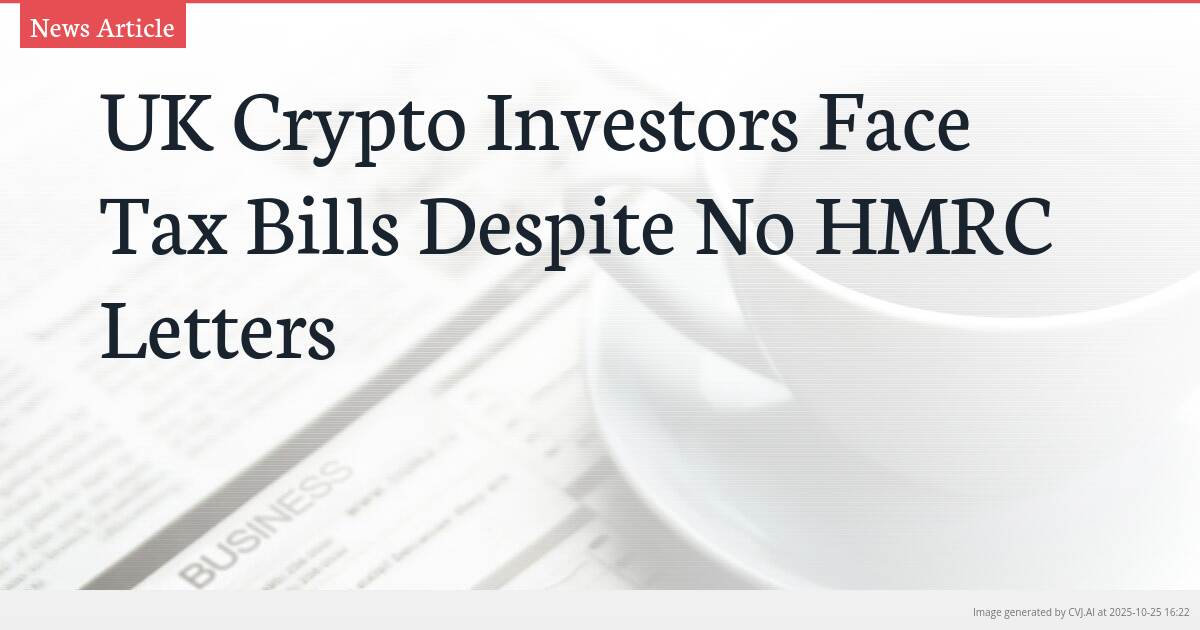This summary text is fully AI-generated and may therefore contain errors or be incomplete.
Introduction
UK cryptocurrency investors are facing unexpected tax liabilities even without receiving formal warnings from HM Revenue & Customs, as the tax authority dramatically escalates its enforcement campaign against undeclared digital asset income. With 65,000 ‘nudge letters’ dispatched in the 2024-25 tax year—more than double the previous year’s total—HMRC is leveraging sophisticated data tracking methods that mean absence of correspondence provides no guarantee of compliance. Tax experts unanimously warn that enhanced international reporting agreements and exchange data sharing have created an environment where all UK crypto investors must proactively verify their tax positions.
Key Points
- HMRC sent 65,000 crypto tax warning letters in 2024-25, doubling previous year's volume
- Tax experts warn investors without letters may still owe taxes due to enhanced data tracking
- Agency using exchange data and international agreements to identify undeclared crypto income
HMRC's Aggressive Enforcement Escalation
HM Revenue & Customs has launched an unprecedented crackdown on cryptocurrency tax compliance, issuing 65,000 warning letters to UK investors during the current 2024-25 tax year. This represents a staggering increase of more than double the number sent in the previous tax period, signaling a dramatic shift in enforcement priorities. The Financial Times revelation of this massive letter campaign underscores HMRC’s determination to close the tax gap in the rapidly expanding digital asset space. These communications, officially termed ‘nudge letters,’ serve as formal notifications urging recipients to review their tax filings and voluntarily declare any previously unreported crypto-related gains before potential audits commence.
The sheer volume of these communications indicates HMRC’s systematic approach to identifying potential non-compliance through data analysis rather than random selection. Each letter represents a specific case where HMRC’s systems have flagged potential undeclared cryptocurrency activity, creating a targeted enforcement strategy that prioritizes high-probability cases. The doubling of letter volume from the previous year demonstrates both improved detection capabilities and increased regulatory focus on the cryptocurrency sector as it matures from niche investment to mainstream asset class.
The False Security of No Correspondence
Despite the massive scale of HMRC’s letter campaign, tax professionals are issuing urgent warnings that UK investors who haven’t received correspondence should not assume they’re in compliance. The absence of a ‘nudge letter’ provides no protection against future tax assessments or penalties, as HMRC’s enforcement capabilities extend far beyond targeted mailings. Experts emphasize that the agency’s growing sophistication in tracking digital asset transactions through exchange data and international reporting agreements means that undeclared gains from years past could still be identified and pursued.
The reality facing UK crypto investors is that HMRC now possesses multiple data streams for identifying cryptocurrency activity, including information sharing agreements with major exchanges and international tax transparency initiatives. These systems operate independently of the letter campaign, meaning investors might face unexpected tax bills even if they never receive formal warning correspondence. The agency’s ability to cross-reference transaction data across multiple platforms and tax years creates a comprehensive enforcement net that extends well beyond the 65,000 specifically identified cases.
Expanding Data Tracking and International Cooperation
HMRC’s enhanced enforcement capabilities stem from significantly expanded data access through both domestic exchange reporting and international cooperation frameworks. The agency has systematically developed relationships with cryptocurrency platforms operating in the UK, requiring increasing levels of transaction reporting that provide detailed insight into investor activity. This domestic data is complemented by information sharing agreements with tax authorities in other jurisdictions, creating a global surveillance network specifically targeting digital asset movements.
The practical implication for UK investors is that transactions conducted on international platforms or through decentralized exchanges are increasingly visible to HMRC through these cooperative arrangements. The Common Reporting Standard (CRS) and other international tax transparency initiatives, originally designed for traditional financial assets, are being adapted to encompass cryptocurrency transactions. This means that even investors who primarily use foreign-based exchanges or peer-to-peer trading platforms cannot assume their activities remain undetected by UK tax authorities.
Proactive Compliance as the Only Safeguard
In this environment of intensified scrutiny, tax experts unanimously recommend that all UK cryptocurrency investors conduct thorough reviews of their transaction history and tax reporting. The voluntary disclosure process referenced in HMRC’s letters remains the most favorable path for resolving previously undeclared liabilities, typically resulting in reduced penalties compared to amounts assessed through audit discovery. Investors should systematically document all cryptocurrency transactions, including purchases, sales, exchanges, and mining activities, across all platforms used.
The complexity of cryptocurrency taxation—involving capital gains calculations, income tax considerations for mining and staking, and special rules for decentralized finance activities—means many investors may have unintentionally underreported their liabilities. Professional tax advice specific to digital assets has become essential for navigating these complexities and ensuring compliance. With HMRC’s enforcement capabilities continuing to expand, the window for voluntary correction is narrowing, making immediate action the most prudent approach for any UK investor with cryptocurrency exposure.
📎 Read the original article on cointelegraph.com

